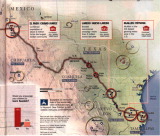Shapleigh UnveilsTexas Borderlands Report
January 3, 2005
El Paso lawmaker says region being hurt by regressive taxation, lack of investment and political polarization.
Written by Steve Taylor, The Quorum Report

Sen. Eliot Shapleigh
A border lawmaker has produced the most detailed report on the living conditions along the Texas-Mexico border since former Comptroller John Sharp's Bordering the Future document in 1998.
State Sen. Eliot Shapleigh (D-El Paso) said he hopes Texas Borderlands: Frontier of the Future will help shape the legislative agenda of border lawmakers and state leaders during the 79th session.
The 290-page report includes subjects as diverse as demographics, taxation, public and higher education, workforce training, health, technology, the environment, transportation, homeland security, housing, and access to capital.
"Today, our state is at a crossroads," Shapleigh said. "Simply put, our future depends on investment in low- and middle-income working families. Texans must demand a government that invests in 21st century educational excellence. If we invest in education, we will prosper. If we do not, we won't."
Texas Borderlands points out that if the 43 counties along the Texas border region were to become a "51st U.S. state," it would rank first in the nation for its poverty rate and last in educational attainment. It would also rank first for school children in poverty, unemployment, and the percentage of adults without a high school diploma. It would be third in deaths from diabetes, and 49th in households with a telephone.
Shapleigh said that although border has long been one of America's poorest regions, regressive taxation, lack of investment and political polarization had made things worse.
Shapleigh said the slide began under former Gov. George W. Bush, when Texas ranked 50th among all states in total general expenditures. Shapleigh said Texas leaders adopted a radical, low-tax, low-service ideology, which denied opportunity, lowered standards of quality education, and destroyed access to health care for millions of low-income and middle-income Texans, especially Hispanics.
"This systematic and institutional denial of opportunity and services in basic programs that have created the foundation of prosperity and success for generations of working families throughout America's history represents an era of 'The Two Texases,'" Shapleigh said.
"In this new era, an elite few grow and prosper by virtue of diversion of tax dollars from critical services and the other, where the vast majority of Texans meet challenges placed in their path because radical leaders value tax cuts over kids, budget cuts over the elderly, and government for the few at the expense of the many."
Shapleigh said Texas now represents a "living laboratory," where "a handful of extremists hijack an entire state and assault the foundations of democracy and widely shared values of freedom, fairness, equality and justice."
Shapleigh said the problem was compounded in 2003, when lawmakers responded to a $10 billion shortfall by further cutting education, health services and other programs. As a result, 167,000 children were removed from the Children's Health Insurance Program, and 46,000 medically needy Texans lost Medicaid. Shapleigh said the border region, with the highest rates of poverty, was worst affected.
Texas Borderlands contrasts the legislature's decision to eliminate the inheritance tax, which could have raised $322 million, with the move to tax students $263 million through increased tuition rates at state universities. "Tax cuts to millionaires were paid by tax hikes to students," Shapleigh said.
Shapleigh said the fact that Texas does not have a state income tax means low- and middle-income families pay disproportionately more in taxes. He cites a 2003 report by the Comptroller that shows a family earning less than $26,816 a year pays 11.1 percent of its income in property and sales taxes. In contrast, a family earning $126,345 per year pays 3.2 percent of its income in property and sales taxes.
Shapleigh said that for decades, Texas leaders had explained the disparities in opportunity and wealth along the border as 'neglect,' and pledged to do better. Each year, however, the mantra for action became 'next year.' He said it was only through court action, such as the Edgewood cases on school finance, and El Paso's court of inquiry into state under-funding, that brought new investment to the border, Shapleigh said.
"With these dramatic fights for equity, Hispanic Texas clearly sent a message that what others called 'neglect' was now clear and intentional discrimination in the distribution of state programs, funding, and tax burden so profound as to deny an entire region the opportunity to succeed," Shapleigh said.
Shapleigh said Texans should demand concepts like fairness, justice, opportunity, and an equitable and adequate tax system from their leaders.
"It is time for a government that opens the doors to great universities, not colleges where the middle class can no longer attend because of tuition hikes. We must keep the promise of the American Dream that every generation can be more prosperous than the last," Shapleigh said. "Only then will our state truly shine as the beacon of hope, freedom and opportunity for every Texan."
To read the Texas Borderlands: Frontier of the Future report, click here.
![]()
![]()
Related Stories
![]()
Fair Use Notice
This site contains copyrighted material the use of which has not always been specifically authorized by the copyright owner. We are making such material available in our efforts to advance understanding of environmental, political, human rights, economic, democracy, scientific, and social justice issues, etc. We believe this constitutes a "fair use" of any such copyrighted material as provided for in section 107 of the US Copyright Law. In accordance with Title 17 U.S.C. Section 107, the material on this site is distributed without profit to those who have expressed a prior interest in receiving the included information for research and educational purposes. For more information go to: http://www.law.cornell.edu/uscode/17/107.shtml. If you wish to use copyrighted material from this site for purposes of your own that go beyond "fair use", you must obtain permission from the copyright owner.